WHĐ (05/4/2025) - Vào chiều thứ Bảy, ngày 26 tháng 10 năm 2024, các tham dự viên Khóa họp thứ hai của Đại hội Thường lệ lần thứ XVI của Thượng Hội đồng Giám mục đã phê chuẩn Văn kiện Chung kết. Đức Thánh Cha Phanxicô cũng đã phê chuẩn và truyền công bố văn kiện này. Sau đây là bản dịch Việt ngữ Văn kiện Chung kết do Ban Dịch thuật Hội đồng Giám mục Việt Nam thực hiện.
Conference on Religions and Climate Change Southeast Asia 2023

CONFERENCE ON RELIGIONS AND CLIMATE CHANGE
SOUTHEAST ASIA (CORECS) 2023
“Religions and Climate Change: Efforts in Bringing Back Religious Values and Local Culture in Environmental Preservation and Sustainable Development”
Panel Session 3
Religion, Science, and Climate Change: Perspective and Experience
Fr. Stanislaus Ferry Sutrisna Wijaya
Eco Learning Camp Foundation, Bandung, Indonesia
Greeting from Allah to all dear beloved brothers and sisters of all faith from Southeast Asia,
- Our planet earth is our only home. More and more people, including people of different faith background, are aware that our planet earth is our only home. Planet earth belongs to God the Creator of the Universe. God is the creator of all people who have faith in God. Planet earth does not belong to only a certain religious group.
- We borrow the earth from our children. At the same time, more and more people, including people of different faith background, are aware that our planet earth belongs to our children and young people. We do not inherit the earth from our ancestors. We only borrow this planet from our children and young people.
- Climate change is already climate emergency and global warming is already global boiling. In 2009, I attended The Asia Pacific Summit for Climate Change led by Al Gore from USA. In 2009 the amount of carbon dioxide was 387 ppm. Experts in climate change said that the limit was 415 ppm. This year 2023 it is already 421 ppm. The world is getting hotter and hotter. In some places the temperature is already exceeding 40 C. This is a very clear sign that “climate change” has become “climate crises” and even “climate emergency”. Antonio Guterres, Secretary General of the United Nations, said that “global warming” is no longer exist because we are experiencing “global boiling”.
- It is already impossible to keep the 1.5C global heating limit. These days we acknowledge that we are already in the process of destroying this our only home we only borrow. We will not be able to keep the 1.5 C global heating limit set by international governments. Our carbon budget is running out very fast. The science related to climate change published by The Intergovernmental Panel on Climate Change (IPCC) is very clear. We already live in a hothouse earth. We inhabit a planet in peril. Ecologically, together all of us are committing suicide.
- Our window of opportunity to save our lives is very limited. We have only 4-7 years. Now or too late. We are both the first generation to be aware and the last generation to do something to save our lives. The call to do something for our lives on earth is very strong especially among our young people of different faith background.
- Total natural disasters in Indonesia. In Indonesia, in 2022 we have already total 3514 natural disasters: 1.516 floods, 1.054 extreme weather, 634 landslides, and 251 forest fires. Until 29 May 2023 we have 1.102 natural disasters: 463 floods, 324 extreme weather, 205 landslides, and 84 forest fires. We also experience a great loss of biodiversity, forests, coral reefs, typhoons, and the rising of sea level which really cause sufferings for many farmers, fishermen, villagers, and poor people.
- On 24 May 2015, Pope Francis published an encyclical letter Laudato Si (Praise be to you My Lord). Laudato Si is “A New Pentecost of the Whole Creation”. Laudato Si is not a doctrine of a religion, but a moral invitation for all people based on science. Pope Francis says, “In this encyclical, I would like to enter into dialogue with all people about our common home.” (Laudato Si No. 3). “Every effort to protect and improve our world entails profound changes in “lifestyles, models of production and consumption, and the established structures of power which today govern societies.”(Laudato Si No. 5) Pope Francis invites us, “Let us be protectors of creation, protectors of God’s plan inscribed in nature and of the environment.”
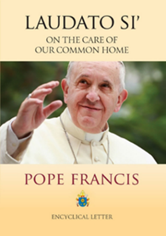
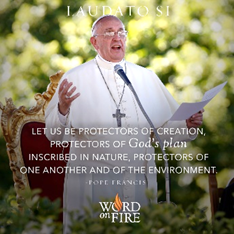
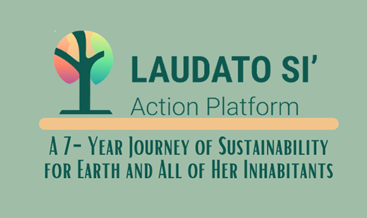
- Document on Human Fraternity for World Peace and Living Together published by the Grand Imam of Al-Azhar, Ahmed el-Tayeb and Pope Francis was signed during a Global Conference on Human Fraternity in Abu Dhabi on 4 February 2019. This encounter reminds us about the meeting of St. Francis of Assisi and Sultan Melek al-Kamil 800 years earlier in September 1219 in Egypt.
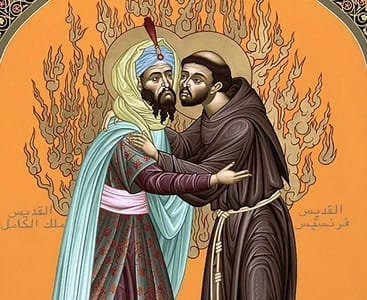
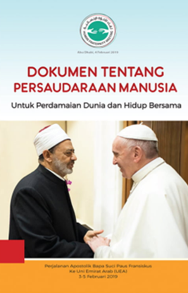
- Faith leads a believer to see in the other a brother or sister to be supported and loved. Through faith in God, who has created the universe, creatures and all human beings (equal on account of His mercy), believers are called to express this human fraternity by safeguarding creation and the entire universe and supporting all persons, especially the poorest and those most in need. (Abu Dhabi Document No.1)
- It is a document that invites all persons who have faith in God and faith in human fraternity to unite and work together so that it may serve as a guide for future generations to advance of mutual respect in the awareness of the great divine grace that makes all human beings brothers and sisters. (Abu Dhabi Document No.3)
- The firm conviction that authentic teachings of religions invite us to remain rooted in the values of peace; to defend the values of mutual understanding, human fraternity and harmonious coexsistence; to re-establish wisdom, justice, and love; to reawaken religious awareness among young people so that future generations may be protected from the realm of materialistic thinking and from dangerous policies of unbrilled greed and indifference that are based on the law of force and not on the force of law. (Abu Dhabi Document No.26)
- On 14 November 2021, Pope Francis has launched a global movement called Laudato Si Action Platform (LSAP) for 7 years, 7 sectors, and 7 goals which are Respond to The Cry of The Earth, Respond to The Cry of The Poor, Ecological Economics, Adoption of Sustainable Lifestyle, Ecological Education, Ecological Spirituality, dan Community Engagement and Participatory Action. There are 7 sectors which are families, educational institutions, economy, religious orders, parishes and dioceses, hospital and health care centers, dan organizations and groups. For universities there is a global movement called Laudato Si University.
- On 4 October 2022, Pope Francis published a new Laudato Si film with the title “The Letter” portraying five people of different faith background, age, and continent in caring our only home. They are Arouna Kande a young Moslem man from Senegal, Chief Dada Borari a leader of indigenous faith from the Amazon in Brazil, Ridhima Pandey a young Hindus girl from Haridwar India, and a scientist couple Dr. Greg Asner dan Dr. Robin Martin from Hawaii. This couple admits openly that they are not practicing any religion, but they acknowledge that in the silence of the depth of the ocean and when admiring the wonder of the sea they always ask themselves “WHO” is behind such beauty and mystery of the universe. “The Letter” is an invitation to all of us to do something to care for the cry of the earth and the cry of the poor (Laudato Si No. 49). Once you know, you cannot look away.

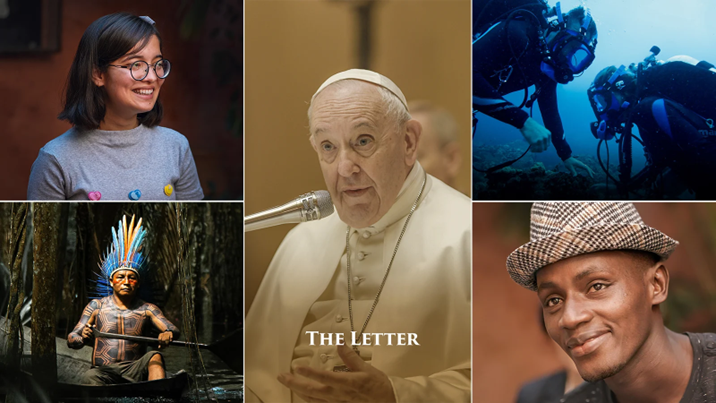
- Today 4 October 2023, at St. Francis of Assisi day, Pope Francis publishes a Second Laudato Si document which is LAUDATE DEUM (Praise to You O God): To all people of good will on the climate crisis.
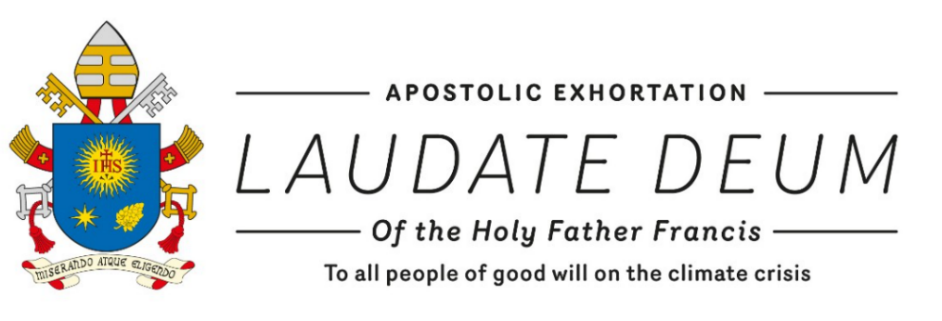
- Laudate Deum (2023) is a call for co-responsibility, in the face of the climate emergency. Pope Francis says, “’Praise God’ is the title of this letter. For when human beings claim to take God’s place, they become their own worst enemies.” That’s how Pope Francis ends his new Apostolic Exhortation, published on the 4th October, the Feast of St Francis of Assisi. It’s a text in continuity with his 2015 encyclical Laudato si’, which is broader in scope. In six chapters and 73 paragraphs, the Successor of Peter tries to clarify and bring to completion that previous text on integral ecology, while at the same time sounding an alarm, and a call for co-responsibility, in the face of the climate emergency.
- The world in which we live is collapsing and may be nearing the breaking point. In particular, the Exhortation looks ahead to COP28, which will be held in Dubai between the end of November and beginning of December. The Holy Father writes: “With the passage of time, I have realized that our responses have not been adequate, while the world in which we live is collapsing and may be nearing the breaking point. In addition to this possibility, it is indubitable that the impact of climate change will increasingly prejudice the lives and families of many persons” (2).
- It's “one of the principal challenges facing society and the global community” and “the effects of climate change are borne by the most vulnerable people, whether at home or around the world” (3).
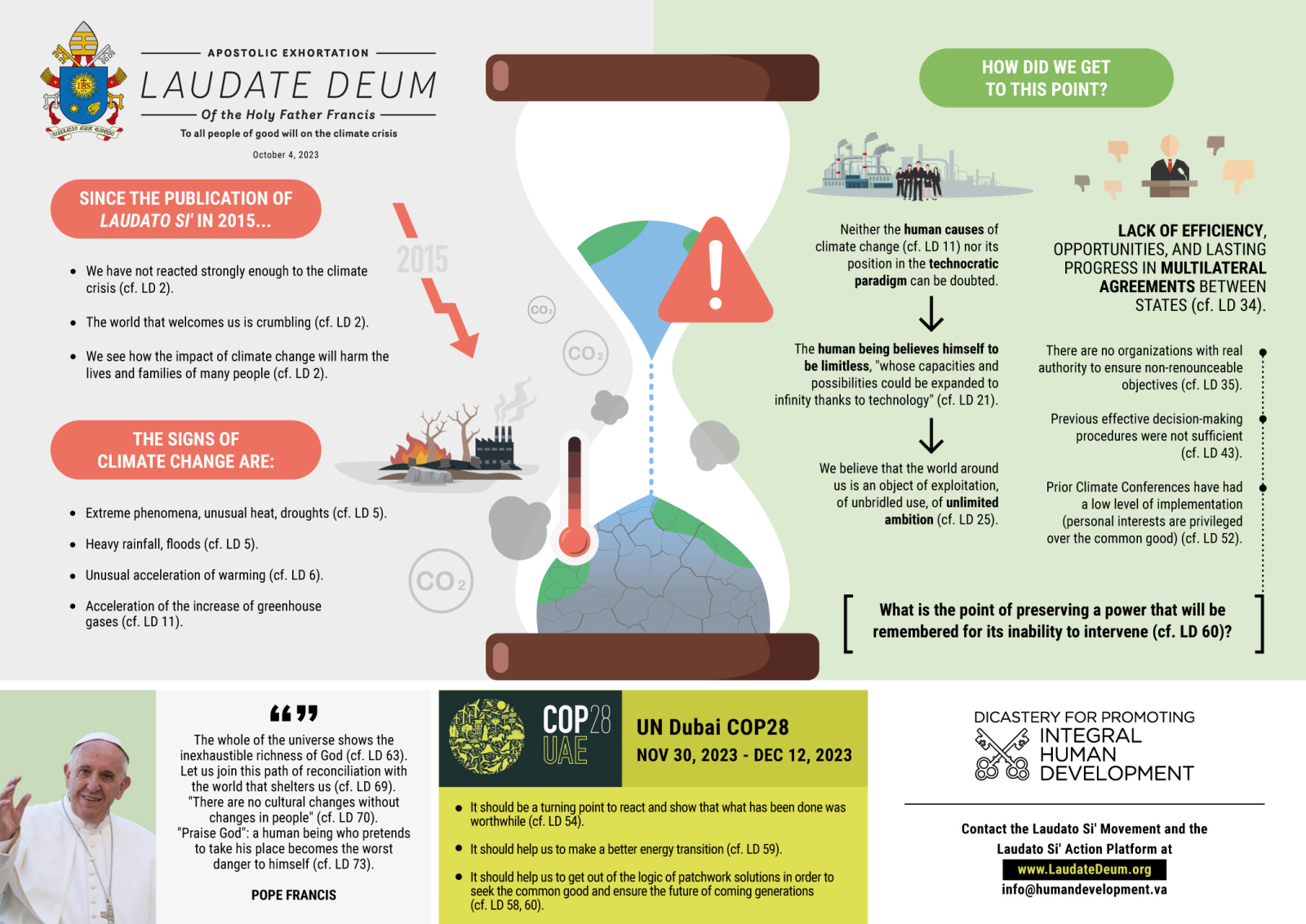
- Pope Francis says, “I believe that Saint Francis is the example par excellence of care for the vulnerable and of an integral ecology lived out joyfully and authentically. He is the patron saint of all who study and work in the area of ecology, and he is also much loved by non-Christians. He was particularly concerned for God’s creation and for the poor and outcast. He loved, and was deeply loved for his joy, his generous self-giving, his openheartedness. He was a mystic and a pilgrim who lived in simplicity and in wonderful harmony with God, with others, with nature and with himself. He shows us just how inseparable the bond is between concern for nature, justice for the poor, commitment to society, and interior peace.” (Laudato Si No. 10)
- In 2014, we established Eco Camp as an interfaith ecological awareness education center. It is interfaith because it was founded by people and open to all people of different faith background. For the last 9 years, at Eco Camp we have been visited by 30 thousand people. They come from different faith background. Mostly are students and teachers whom we call Green Leaders and Children of the Earth. They become agents of change in raising ecological awareness and action in their own schools and communities. Eco Camp is a center promoting the Document on Human Fraternity for World Peace and Living Together, Laudato Si, and Laudato Si Action Platform.
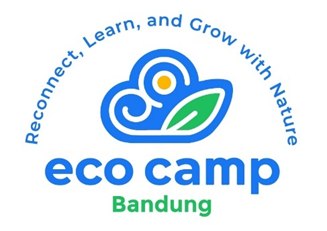
- An invitation to transform our educational centers to become Center on Human Fraternity for World Peace and Living Together. At the end, I want to invite my brothers and sisters from Southeast Asia to transform our educational centers, our schools, our universities, our hospitals, our neighborhood, our communities, our societies, and our families to be a center promoting the Document on Human Fraternity for World Peace and Living Together, Laudato Si, and Laudato Si Action Platform with 7 goals:
- The Response to the Cry of the Earth is a call to protect our common home for the wellbeing of all, as we equitably address the climate crisis, biodiversity loss, and ecological sustainability. Actions could include the adoption of renewable energies and energy sufficiency measures, achieving carbon neutrality, protecting biodiversity, promoting sustainable agriculture, and guaranteeing access to clean water for all.
- The Response to the Cry of the Poor is a call to promote eco-justice, aware that we are called to defend human life from conception to death, and all forms of life on Earth. Actions could include projects to promote solidarity, with special attention given to vulnerable groups such as indigenous communities, refugees, migrants, and children at risk, analysis and improvement of social systems, and social service programmes.
- Ecological Economics acknowledges that the economy is a sub-system of human society, which itself is embedded within the biosphere–our common home. Actions could include sustainable production and consumption, ethical investments, divestment from fossil fuels and any activity harmful to the planet and the people, supporting circular economies, and prioritizing care labour and protecting the dignity of workers.
- The Adoption of Sustainable Lifestyles is grounded in the idea of sufficiency, and promoting sobriety in the use of resources and energy. Actions could include reducing waste and recycling, adopting sustainable dietary habits (opting for a more plant-based diet and reducing meat consumption), greater use of public transport, active mobility (walking, cycling), and avoiding single use items (e.g. plastic, etc.).
- Ecological Education is about re-thinking and re-designing curricular and institutional reform in the spirit of integral ecology in order to foster ecological awareness and transformative action. Actions could include ensuring equitable access to education for all and promoting human rights, fostering Laudato Si’ themes within the community, encouraging ecological leadership (students, teachers), and ecological restoration activities.
- Ecological Spirituality springs from a profound ecological conversion and helps us to “discover God in all things”, both in the beauty of creation and in the sighs of the sick and the groans of the afflicted, aware that the life of the spirit is not dissociated from worldly realities. Actions could include promoting creation-based liturgical celebrations, developing ecological catechesis, retreats and formation programmes, etc.
- Community resilience and empowerment envisage a synodal journey of community engagement and participatory action at various levels. Actions could include promoting advocacy and developing people’s campaigns, encouraging rootedness and a sense of belonging in local communities and neighbourhood ecosystems.
- What is Eco Camp Bandung? Eco Camp is an interfaith practice center established in 2014 providing ecological awareness programs for children to adults.
- What documents are related to Eco Camp? Eco Camp is related and promoting Document on Human Fraternity for World Peace and Living Together (Abu Dhabi, 4 February 2019), Laudato Si (Pope Francis, 24 May 2015), and Laudate Deum (Pope Francis, 4 October 2023).
- How effective is Eco Camp Bandung? From 2014 to 2023 Eco Camp has 30.000 visitors, 536 Green Leaders, and 75 Youth Leaders. From 2021-2023, our outreach programs supported by Soho Global Health and Ultra Jaya has provided ecological awareness programs for 2.162 schools in 4 provinces and 12 cities for 69.628 children and 69.628 mothers.
- How effective is Eco Camp Bandung? The top environmental problems are selfishness, greed, and apathy. To deal with these we need a spiritual and cultural transformation. We are in the process of training ecological spirituality with 1 earth elder, 4 founders, and 7 Shambhala Warriors or our young leaders with daily and weekly meeting for one year. We hope this training will provide a very strong ecological spirituality and ecological leadership in Eco Camp.
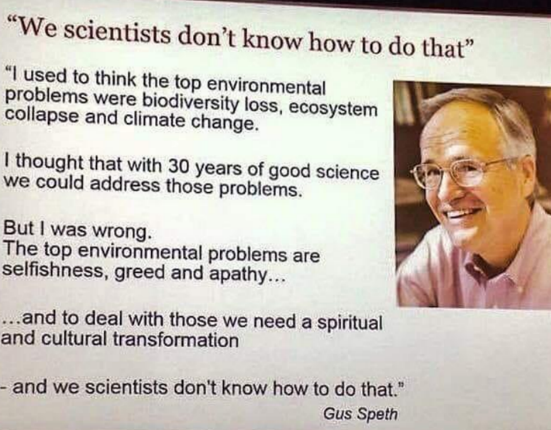
- How effective is Eco Camp Bandung? According to Document on Human Fraternity for World Peace and Living Together (Abu Dhabi, 4 February 2019): Faith leads a believer to see I the other a brother or sister to be supported and loved. According to Laudato Si (Pope Francis, 24 May 2015): Ecological conversion and the need to no longer consider creation as an object to be exploited, but as a reality to be safeguarded “as a sacred gift from our Creator”. So in my own experiences, 10 years at Eco Camp is a time when I learn to see others as my brothers and sisters, to experience ecological conversion, and to experience nature as a sacred gift from God. These experiences and spiritual findings are the best gift and blessing I receive from God through Eco Camp. This is my “Eco Camp experience”, so where is your own “Eco Camp experience” in your own place?
- The future of our lives depends on our answer to the invitation in promoting the Document on Human Fraternity for World Peace and Living Together, Laudato Si, Laudato Si Action Platform with 7 goals, and Laudate Deum. Thank you.
Jakarta, 4 October 2023
Fr. Stanislaus Ferry Sutrisna Wijaya (Ferry SW),
Eco Learning Camp Foundation (Yayasan Sahabat Lingkungan Hidup)
+62.811.223277, 2908.sutrisna@gmail.com
- VĂN KIỆN CHUNG KẾT CỦA ĐẠI HỘI THƯỜNG LỆ LẦN THỨ XVI CỦA THƯỢNG HỘI ĐỒNG GIÁM MỤC WHĐ (05/4/2025) - Vào chiều thứ Bảy, ngày 26 tháng 10 năm 2024, các tham dự viên Khóa họp thứ hai của Đại hội Thường lệ lần thứ XVI của Thượng Hội đồng Giám mục đã phê chuẩn Văn kiện Chung kết. Đức Thánh Cha Phanxicô cũng đã phê chuẩn và truyền công bố văn kiện này. Sau đây là bản dịch Việt ngữ VănTrung Tâm Mục Vụ Tổng Giáo Phận TP HCMRated 5/5 based on 1 customer reviewsRead more
- Chúa Giêsu Kitô là niềm hy vọng của chúng ta (09/4/2025): Bài 12 - Gặp gỡ người giàu có - “Đức Giêsu đưa mắt nhìn anh ta” (Mc 10,21) Chúa Giêsu Kitô là niềm hy vọng của chúng ta (09/4/2025): Bài 12 - Gặp gỡ người giàu có - “Đức Giêsu đưa mắt nhìn anh ta” (Mc 10,21)
Lời mời gọi sống tương quan mật thiết với Chúa để cảm nhận được cái nhìn yêu thương của Chúa.
Trung Tâm Mục Vụ Tổng Giáo Phận TP HCMRated 5/5 based on 1 customer reviewsRead more - Chúa Giêsu Kitô là niềm hy vọng của chúng ta (02/4/2025): Bài 11 - Cuộc gặp gỡ ông Dakêu - “Hôm nay tôi phải ở lại nhà ông” (Lk 19,5) Chúa Giêsu Kitô là niềm hy vọng của chúng ta (02/4/2025): Bài 11 - Cuộc gặp gỡ ông Dakêu - “Hôm nay tôi phải ở lại nhà ông” (Lk 19,5)
Cần học gương ông Dakêu để không mất niềm hy vọng vì tin rằng Thiên Chúa luôn tìm kiếm chúng ta dù chúng ta đang sống trong tình trạng nào.
Trung Tâm Mục Vụ Tổng Giáo Phận TP HCMRated 5/5 based on 1 customer reviewsRead more - Chúa Giêsu Kitô là niềm hy vọng của chúng ta (26/3/2025): Bài 10 - Cuộc gặp gỡ người phụ nữ xứ Samaria - “Chị cho tôi xin chút nước uống!” (Ga 4,7) Chúa Giêsu Kitô là niềm hy vọng của chúng ta (26/3/2025): Bài 10 - Cuộc gặp gỡ người phụ nữ xứ Samaria - “Chị cho tôi xin chút nước uống!” (Ga 4,7)
Để loan báo Tin Mừng cần phải có kinh nghiệm được Chúa yêu thương, đón nhận và tha thứ.
Trung Tâm Mục Vụ Tổng Giáo Phận TP HCMRated 5/5 based on 1 customer reviewsRead more - Hành hương trong lòng Giáo hội - Phần 4: Hành hương với Đức Mẹ Maria Hành hương trong lòng Giáo hội - Phần 4: Hành hương với Đức Mẹ Maria
Ý nghĩa và việc tôn kính Đức Mẹ Maria của người Công giáo Việt Nam.
Trung Tâm Mục Vụ Tổng Giáo Phận TP HCMRated 5/5 based on 1 customer reviewsRead more
- Bạo lực nhân danh Chúa là phạm thánh
Lên án các hành vi bạo lực tôn giáo đã diễn ra trong mùa Giáng sinh, chủ tịch Hội đồng Giám mục Hoa Kỳ tuyên bố: Sự bạo lực nhân danh Chúa là phạm thánh...
Trung Tâm Mục Vụ Tổng Giáo Phận TP HCMRated 0/5 based on 0 customer reviewsRead more

